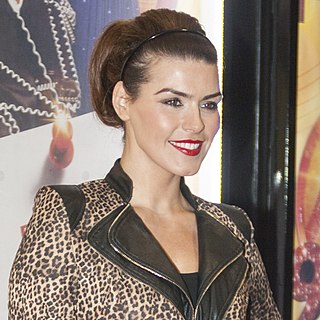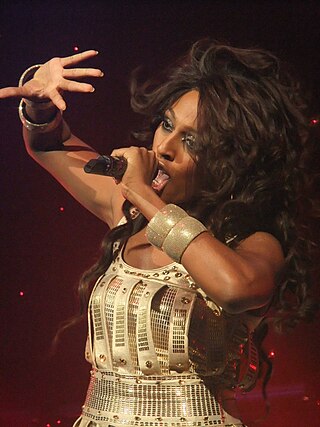
Pop Idol is a British music competition television series created by Simon Fuller which ran on ITV from 2001 to 2003. The aim of the show was to decide the best new young pop singer in the UK based on viewer voting and participation. Two series were broadcast, one in 2001–2002 and a second in 2003. An immense success when it launched in 2001, Maggie Brown in The Guardian wrote, "the show became a seminal reality/entertainment format once on air that autumn". Series judge Simon Cowell became a major public figure in entertainment, and the show produced instant No. 1 chart hits, including for the first series winner Will Young, whose single "Evergreen" was the fastest-selling debut in UK chart history and the best-selling song of 2002. Pop Idol was subsequently put on an indefinite hiatus after Simon Cowell announced the launch of The X Factor in the UK in April 2004.

Fame Academy was a British television talent competition to search for and educate new musical talents. The winner received a chance to become a successful music artist and part of the international franchise Star Academy known under various titles in various countries.
Alexandra Rebecca Parks is a retired English singer-songwriter. In 2003 Parks won the second series of the BBC Television programme Fame Academy immediately followed by the release of her first album entitled Introduction, which went double platinum in the United Kingdom and gold in several other European countries. In 2005 she released her second album, Honesty, but was subsequently dropped by her record label in February 2006.
Sinéad Quinn is a Northern Irish singer, best known as a contestant in the first series of the UK BBC TV series Fame Academy in 2002. She later went on to sign a recording contract, released an album, and had a #2 UK single with "I Can't Break Down" in February 2003.

Alistair Richard Griffin is an English singer-songwriter and musician. Already an established songwriter, he first became famous as a solo artist through his appearances on the BBC television show Fame Academy 2 in 2003, where he was mentored by Robin Gibb of the Bee Gees. He subsequently had two top twenty hit singles and a top twenty album in the UK.
Richard Park, is Senior Programming Advisor at Global Media & Entertainment where he advises on all Global brands including Capital, Capital XTRA, Heart, LBC, Classic FM, Smooth and Radio X. He was previously a media consultant and broadcaster in the UK.
The first series of Fame Academy, a BBC reality talent search, was first broadcast in the United Kingdom over ten weeks in October - December 2002. It was won by David Sneddon. The live shows were presented by Cat Deeley and Patrick Kielty.

Carolynne Willey is a British singer-songwriter, actress and former model from Leeds, England. She is a founding member of the Carolynne Good Band, based in Leeds and London. She is best known for finishing in third place on the second series of the BBC singing competition Fame Academy in 2003. In 2011, Willey was a contestant on The X Factor and made it to the judges' houses' stage of the competition. She returned to the show the following series in 2012 and made it to the live shows, but was eliminated after the first live show following a sing-off against Rylan Clark.

"Bring It On" is the debut single from British singer/songwriter Alistair Griffin, and is also the title track and first release from his debut album, Bring It On. It was released in December 2003 as a double A-side with "My Lover's Prayer", a duet with Robin Gibb of the Bee Gees and reached number five on the UK Singles Chart.

Bring It On is the debut album by British singer/songwriter Alistair Griffin. Released in January 2004 on the UMTV label, it reached #12 in the UK album charts.

Comic Relief Does Fame Academy is a spin-off of the original Fame Academy show where celebrities students sing as students of the Academy. The programme was launched in 2003 to help raise money for the charities supported by Comic Relief, with the final of the show occurring on Red Nose Day.

The X Factor is a British television music competition to find new singing talent. The fifth series was broadcast on ITV from 16 August 2008 until 13 December 2008. Dermot O'Leary returned to present the main show on ITV, while Fearne Cotton was replaced by Holly Willoughby as presenter of spin-off show The Xtra Factor on ITV2. Simon Cowell, Louis Walsh, and Dannii Minogue returned to the judging panel. Sharon Osbourne left after four series and was replaced by Cheryl Cole. The series was won by Alexandra Burke, with Cole emerging as the winning mentor. Auditions in front of producers were held in April and May, with callbacks in front of the judges in June. The number of applicants for series 5 reached an all-time high with a reported 182,000 people auditioning. A number of well-established music acts from around the world, such as Beyoncé, Mariah Carey, Britney Spears, Girls Aloud, Take That, Il Divo, and series 3 winner Leona Lewis, performed during the live stages of the show.

Popstars: The Rivals is a British television talent show series that was broadcast on ITV in late 2002. It was the second UK series of the international Popstars franchise. Unlike Popstars, which resulted in the formation of one winning group, Hear'Say, Popstars: The Rivals created two rival groups, Girls Aloud and One True Voice, who competed against each other for the Christmas number one spot on the UK Singles Chart. Girls Aloud won and would go on to achieve twenty consecutive top ten hits, four number ones and six top ten albums, two of which reached number one and from that, group member Cheryl would achieve five number-one singles and two number one albums.
The first series of British reality television show Pop Idol was broadcast on ITV in the United Kingdom during the winter months of 2001 and 2002. The show was a singing competition open to people aged between 16 and 26 years old, with the winner receiving a £1 million recording contract to release their debut album. Pop Idol received ratings of as high as 10 million viewers for shows before the live final. The footage of the program's opening titles, as well as the live final of this series, was used in the first season of American Idol, in which Kelly Clarkson won the season.
Fame Academy is a British television programme that ran for two series, in 2002 and 2004. The show was produced for the BBC in a reality television format. The winners of the show, David Sneddon and Alex Parks, were awarded music recording contracts to allow them to release music and live like top recording artists for a year. Sneddon had a run of three top-20 hits, including his debut single "Stop Living the Lie", which peaked at number one on the UK Singles Chart in January 2003. David Sneddon signed to major music publisher Sony/ATV Music Publishing in 2009 as a songwriter. Parks' debut single "Maybe That's What It Takes" charted at number three in November 2003.

The X Factor is a British television music competition to find new singing talent. The seventh series started on ITV on 21 August 2010 and ended on 12 December 2010. The series saw the creation of the boy band One Direction, from boys who entered the competition as individuals. The winner of the competition was Matt Cardle. Cardle was mentored throughout the show by Dannii Minogue. After the victory, he released his debut single "When We Collide". A total of 15,448,019 votes were cast throughout the series. It was presented by Dermot O'Leary, with spin-off show The Xtra Factor presented by Konnie Huq on ITV2, who took over from Holly Willoughby.
The X Factor in the UK has been subject to much controversy and criticism since its launch in 2004. This has included allegations of conflict of interest, voting irregularities and overcharging, product placement for sponsors, staging scenes, use of pitch correction technology, and exploiting vulnerable contestants. The series has also been criticised for developing singers as marketable products rather than creative individuals. As of April 2020, there have been fifteen completed series broadcast on the ITV network, as well as spin-offs The X Factor: Celebrity (2019) and The X Factor: The Band (2019).
The X Factor is a British television music competition to find new singing talent. The ninth series began airing on ITV on 18 August 2012 and ended on 9 December 2012. Dermot O'Leary returned as presenter of the main show on ITV, whilst Caroline Flack and Olly Murs returned to co-present The Xtra Factor on ITV2. Louis Walsh, Gary Barlow and Tulisa returned as judges. Nicole Scherzinger was confirmed as the fourth permanent judge after Geri Halliwell, Leona Lewis, Rita Ora, Mel B, Anastacia and Scherzinger herself stood in as guest judges for the vacant position left by Kelly Rowland. After the show of 8 December, two of Scherzinger's acts, James Arthur and Jahméne Douglas, became the top two, meaning that Scherzinger was guaranteed to win. Arthur was announced as the winner on 9 December, and released a cover of Shontelle's "Impossible" as his winner's song. As of 2016, it is the most successful winner's single in the show's history.
"My Lover's Prayer" is a song performed by the Bee Gees, written by Barry Gibb, Robin Gibb and Maurice Gibb, and was released in 1997 on the album Still Waters. The track was originally written and recorded in 1995, but it was only a demo.
Comic Relief Does Fame Academy, a spin-off of the original Fame Academy show where celebrities students sing as students of the Academy to help raise money for the charities supported by Comic Relief, returned for a second live airing on 26 February 2005. It was once again hosted by Patrick Kielty and Cat Deeley. During the Comic Relief show on 11 March, Edith Bowman was announced as the winner.







